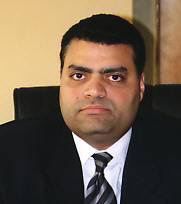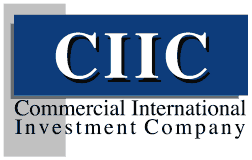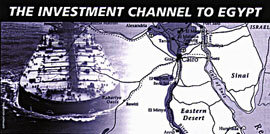
|


Read our exclusive interview
|

 CIIC CIIC
Commercial International Investment Company
Manager:
Mr. Yasser El Mallawany,
Managing Director
Contact:
9 Mohamed Fahmy St.
Cairo
Egypt
Tel. (20) 2 594.3878
Fax: (20) 2 354.3182
Head of Middle East Department
Mr.Rupert Wise
16th Floor – Garden City
London
United Kingdom
Tel : (44 171) 282.4212
|

When the Suez canal forged a new path through the continent, it revolutionised trade in Egypt. Egypt now stands poised for a new revolution, a revolution in investment, and the world is turning to investigate. Of all the emerging markets, Egypt stands out in its success to attract international investors. Investors have seen the Egyptian Government's solid commitment to its reforms program, the successful progress in the privatization of promising state-owned firms, and the continued liberalisation of trade. And, they are impressed. Investment in Egypt is now flouriching and is set to take off to higher levels. Commercial International Bank (CIB), Egypt's leading private sector bank recognised the opportunity of creating a diversified financial group capable of assuming the lead role in the provision of a wide spectrum of quality, professional investment banking services, and established Commercial International Investment Company (CIIC) in 1994. CIIC has quickly risen to become one of the most respected banking institutions in Egypt, with an integrated network of brokerage and assets management affiliates. Offering a comprehensive range of corporate finance services, CIIC arranges both debt and equities issues, placement and underwriting services and financial advisory services of all kinds, including mergers and acquisitions. Firmly dedicated to the enhancement of the financial sector in Egypt, CIIC is pioneering new channels for investing in Egypt. CIIC, a new direction in investment.
 Strategy
Strategy
 Company Profile Company Profile
CIIC was established in November 1994 as a closed shareholding company, to provide and expand the investment banking services previously extended by the Commercial International Bank’s Merchant Division. The company’s two main shareholders are the National Bank of Egypt and the Commercial International Bank that hold 10 per cent and 15 per cent respectively of CIIC’s paid-in capital. A number of high networth Egyptian and Arab individuals and financial institutions hold the balance. CIIC’s capital progressively increased from EGP 25 million at incorporation to EGP
500 million in February 1997. Today its networth stands at more than EGP 600 million. The company employs a team of dedicated Egyptian corporate finance professionals with comprehensive financial and capital market expertise.
 Company’s Mandates Company’s Mandates
The firm has won mandates for a wide range of investment banking activities, corresponding to its lines of business, including corporate finance advisory work privatization issues, private equity and debt issues, underwriting services and mergers and acquisitions. The corporate finance division prides itself on its numerous and unprecedented achievements. Such landmark transactions include: the Egyptian first initial public offering for CIB on the Cairo Stock Exchange for a total value of EGP 390 million. The first private placement in the privatization process of El Nasr Boilers to Babcock and Wilcox International for a total amount of US$ 16 million. The first GDR out of Egypt was arranged by CIIC for CIB for a total value of US$ 120 million. The first private sector IPO on Cairo Stock Exchange being Cairo Precision Industries Co. for a total value of EGP
25.5 million. The first sizable public sector full floatation of El Nasr Clothing and Textiles for a total deal size of EGP 197 million representing 63% of the company’s share capital. The first private sector strategic alliance on the Egyptian market: the purchase concrete fashion and retail house by the Goldentex Group. The most recent deals completed by CIIC include the international and local private placement of 2,943,000 shares of International Electronics for a total value of EGP 156 million. The second deal is the international and local private placement of 600,000 shares of Alexandria Real Estate Investment Company for total value of EGP 92.3 million. Both issues have been heavily oversubscribed. CIIC has also recently completed the EGP 400 million capital increase for MOBINIL as well as the arrangement of the acquisition of the San Stefano Hotel from the Holding Company for Housing, Tourism and Cinema by a consortium of Egyptian businessmen.
 3/ Company Structure 3/ Company Structure
CIIC owns 80% of Intercapital Securities, a brokerage firm established in 1995. Intercapital currently holds a 10.6% market share of EGP 2.6 billion secondary market turnover and has a particularly strong domestic position.
CIIC has recently incorporated Millenium Fund Management Co. Over its first two months of operations have managed to secure mandates for the launch of 3 funds sponsored by both Al Watany Bank of Egypt and National Bank of Egypt collectively bringing the funds under management to a total of EGP 500 million
 INTERVIEW WITH INTERVIEW WITH
MR. YASSER EL-MALLAWANY
MANAGING DIRECTOR OF COMMERCIAL INTERNATIONAL INVESTMENT COMPANY (CIIC)
Monday 21st December 1998
1/Q: Could you give our readers a brief historical background of CIIC?
CIIC is the largest commercial investment bank in Egypt. It is the sixth wealthiest capitalized financial institution with a capital base of one-half billion Egyptian pounds (about $180,000,000). We have been formed in the beginning to be the investment banking arm of the Commercial International Bank. After a period of time we became independent as the largest commercial investment bank. Our activities are primarily in commercial banking activities, proprietor investment and private equities. We have invested more than L.E. 850 million in three years in private equities and direct investments, which have higher net asset value. We have presence in 101 companies which cover almost all sectors of the egyptian economy. Our private activity is structured by industry and by activity. This is one side of the operation. The other side is the investment banking. We have 45% market share of investment banking products including public offerings, privatizations and so on. We have done more than L.E. 4.5 billion of offerings since we started. In addition, we have joint ventures or affiliates and subsidiaries in different financial fields. We have our brokerage placing operation which is a joint venture between CIIC and ING Barrings, a portfolio management company again with ING Barrings and an asset management affiliate with Alliance Capital Management that runs the biggest off shore fund for Egypt which is the Nile Growth Fund. We have a leasing subsidiary with ORIX of Japan as well.
4/Q: What are the main guidelines of your strategy to increase your market share?
We believe that our affiliation with the international partners provide us with strength and also the resources that we can call on to. In addition, we believe that we provide our services according to international standards so we try as much as we can to do the job right and to expand our placing capabilities which is the crux of our edge.
|
5/Q: In 1992, according to the structural reform the capital market has been revitalized.Still, some say that the Egyptian Stock Market is still in its infancy
(some international institutional investors think that the market is too small). What is your opinion?
There is no depth yet. There are plenty of factors that led to the soft stock market. The first was the crash that took place all over the world. The second factor was that the privatization program was not done as quickly as it was expected which is very important. We had some controversy with respect to some laws and regulations regarding Law no.5. That led to the market becoming sluggish and soft. I believe that is why the challenge is to concentrate on direct investment and at the same time strengthen the stock market by improving the regulations, the transparency and so forth. The government is working on both fronts. Looking at the 1999 plans, the situation will differ dramaticaly, specialy with the privatization of insurance, telecom, banking and electricity in addition to instating the long-term mortgage in the system.
6/Q: There are only 18 companies that trade corporate bonds on the market. What do you think should be done to increase that number?
We believe that the stock market can not function on equities only. There has to be a bond side to it. In mature markets bonds represent 50% to 55% of the whole market. At the moment I can tell you that CIIC has mandates for issuing bonds in excess of 1.2 million. We would like to have that executed and we would like to form consortiums with other players in the market to create a momentum of bid and offer.
7/Q: Do you agree that the best state companies have already been privatized?
You may say that the easy ones have been sold. You have 314 public companies to be sold and those are not as easy as before because they need restructuring and. In addition, you still have insurance, banking, telecom and infrastructure. We have not really scratched the surface. If you take cement for example, I do not see any good reason for the existing cement companies that have been floated not to continue selling the whole residual block to one shareholder. It creates more value. There is still much room in the privatization program.
8/Q: In the States, "contacts often mean contracts". What are you doing to attract Fund Managers or Foreign Investors?
Our style of doing business is very transactional. We have our corporate relationships that have been built throughout the years since we have been an affiliate of Chase Manhattan. But, the links should be universal. What we are doing is that if there is a transaction we go and reach the possible candidates that may be interested and we offer the product to them. We do not normally do an overall campaign in Egypt or in any country generally speaking, but what we do is that we take a certain message to a targeted body that would be interested in a certain project.
- Are you targeting specific kinds of investors?
Yes. It all depends on which industry the transaction falls under.
9/Q: What do you think about the image problem that Egypt is suffering from at the moment?
The problem was not there six months ago. We have to move and do drastic measures to get the attention of the international market. That is basically it. One of the things that have to be reformed is the legislative system. If we do a consecutive three or four deals in privatization in strategic sectors which have a big activity and capitalization then the situation will be different. 1998 was a slow year.
10/Q: During the process of privatization, what were the main achievements of CIIC?
We were the investment bank that really introduced all the new products to the market. We did the first IPO in 1993 when the market was immature and there was no liquidity what so ever. It was sizeable, about L.E. 400 million. We did the first privatization ever to take place in Egypt. We did the first private sector company to be introduced in the stock market. We did the first GDR. We took the first company internationally as a GDR and then we did three thereafter. We floated the largest private sector conglomerate on the international market. We bought Dolce for Nestle.
11/Q: Could you give us your personal background?
I have been a banker my entire life. I graduated in Egypt in 1981 and I joined Chase National where I had my tough years. Then the Commercial International Bank took over. I was selected to handle the investment banking operation at the beginning of the process of reform. In 1996 I was selected as the Managing Director of CIIC.
12/Q: What will be your final message to our readers?
Perceptions are sometimes different from reality. Egypt has to be taken seriously because it has an intellectual society and because of the wealth of its personnel and manpower. It should not be viewed only from reports but there must be extensive visits and analysis, seeing is believing and this applies particularly to the conglomerates.
- Are you specialized in certain kind of activities?
Merchant banking is our major activity where we provide advisory work for offerings, privitization, private placements…..etc.. additionaly, each subsidery and affiliate are specialized in its own field.
2/Q: Foreign brokers are publishing glowing reports about the government’s strong commitment to economic reform and privatization. What is your opinion?
I think that we have achieved the first phase of our reform and now it is time to consolidate and go through the second phase. Given the turbulence that took place in the international markets, in Russia and South East Asia, fund managers became a little bit reluctant when it came to allocation of funds to emerging markets. We have to be more dynamic going into 1999 by going into the more strategic sectors of the economy be it insurance, banking, telecom, electricity and so forth. We have to continue with our basic reforms and keep the momentum in order to attract again foreign interest.
3/Q: In the second phase of the privatization what will the role of CIIC be?
We have different roles to play. We are on the short list of professional investment bankers that will proceed with the privatization process. So, we will continue with our role in the privateization program where we have proven our effectiveness. In addition to the fact that CIIC in its own merits is an investor that invests part of its own funds in privatized companies |
© World INvestment NEws, 1998.
This is the electronic edition of the special country report on Egypt published in FORBES Magazine,
May 31st issue.
Developed by AgenciaE.Tv |
|
|
|
|
|
|
|
|
|
|

